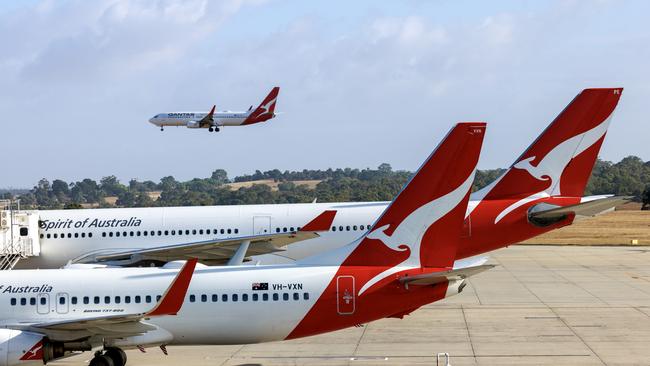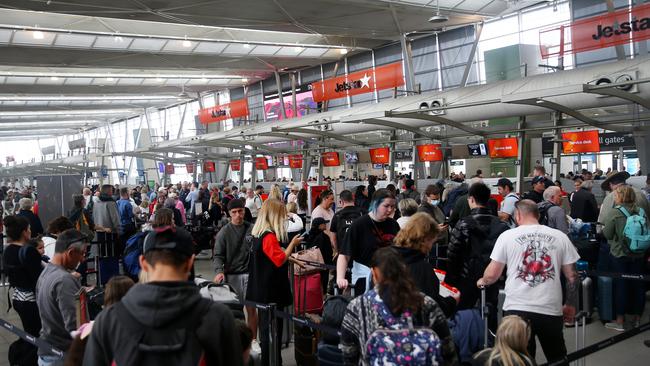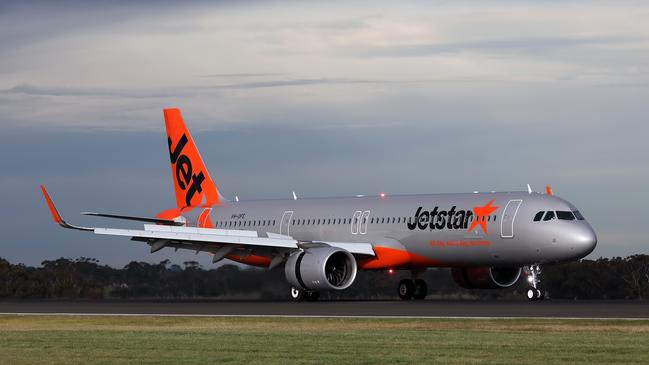Qantas on-time performance cracks 13-month high as Jetstar cancellations hit five-year low
Airlines are edging closer to pre-Covid-19 levels of reliability, driven by improved performance by budget carriers, as Qantas has its best month in more than a year despite strike action.

Domestic airlines have overcome air traffic control shortages, wild weather and industrial action to get more passengers to their destination on schedule in March than at any time in two years as punctuality edges closer to pre-pandemic levels.
Federal government data showed on time performance over all routes operated by nine participating airlines lifted 6.2 percentage points in the past year to 77.2 per cent of services arriving on time, or 22.8 per cent late.
Australia’s largest airline, Qantas achieved its best on time performance since February 2023, with 77.3 per cent of its 20,238 scheduled flights arriving on time, while rival Virgin Australia had its strongest month in two years with 75.1 per cent of 12,046 flights on schedule.
The Bureau of Infrastructure and Transport Research Economics considered a flight on time if it arrived within 15 minutes of its scheduled time, while a cancellation was recorded if it was not rescheduled within seven days.
March was the best month for on time performance since February 2022, albeit that period had flight volumes half the current rate and passenger volumes were still suppressed due to lingering Covid-19 laws.

Delays have been a common occurrence across major carriers in the initial period after as surging passenger demand combined with staffing shortages and high levels of sickness.
More recently, delays and cancellations have been driven by weather, industrial action and air traffic control staffing shortages, which in February saw Sydney Airport forced to slow movements to 26 an hour 50.
March saw cancellations hit a two-year low of 2.8 per cent with 1349 flights of the 47,384 scheduled not operating.
Qantas also recorded its lowest mishandled baggage rate in six years, as the airline continued to focus on improving customer experience, including rolling out baggage tracking through its app.
Qantas head of operations centre Daniel Dihen told The Australian that positive results were beginning to show after work done by the airline in the past six months to improve reliability following a rocky restart after Covid-19.
“Probably the biggest impact to cancellations and on-time performance coming out of Covid was absenteeism. There was a massive push externally on to Qantas to keep people at home if they might be unwell and that has a knock on effect,” he said.
“It’s been a long road on the recovery front since Covid-19, but Qantas is definitely and evidently at its best right now. We are continuing to outperform our major competitor, our on time performance is up, mishandled baggage rates are down.”
Brisbane-based Virgin Australia on-time arrivals hit a two-year high after being the worst performer in February and being plagued by reliability issues in recent months, with 57 per cent of services on-time in November.
“We remain firmly focused on consistently delivering a stable and reliable service while providing great value and choice to Australian travellers,” the airline said.
Budget carrier Bonza had the strongest performance as 82.8 per cent of its 822 flown sectors arrived on time. Jetstar continued a major turnaround by the airline, with 80.9 per cent of domestic flights arriving on time in March and cancellation rates down to 1.5 per cent.
It was Jetstars’ lowest cancellation rate in almost five years and a strong improvement from the year prior, when 38.1 per cent of services were late and 7.1 per cent of flights were cancelled.
Jetstar chief operating officer Matt Franzi said the airline had improved punctuality in recent months by working hard to better prepare for when things don’t go to plan.
“While these are strong results, we remain focused on further improving our operations and delivering a safe and reliable service for our customers every time they fly with us,” he said.
“Bad weather, air traffic control restrictions and unexpected aircraft maintenance can all cause problems with getting flights away on time, so the job is never done for our teams.”

SkyTrans, which operates charter flights and some services in northern Queensland, had the worst on-time with 30.8 per cent of 402 scheduled flights late, and 11.2 per cent cancelled.
Of the major carriers, Qantas had a cancellation rate of 3.8 per cent from 20,238 flights scheduled, but it said continued pilot industrial action in WA accounted for more than 40 per cent of cancellations. Cancellations on the rest of the network were in line with the average long-term rate for the industry at 2.2 per cent.
BITRE noted cancellations were highest between Perth and Darwin at 13.6 per cent, while flights to Karratha and Port Headland from Perth were above 10 per cent.
Mr Dihen said that it was a myth that Qantas cancelled flights because of low loads because flights that did not operate had a knock off effect of aircraft and crew not being where they needed to be.
“It’s actually challenging for us to do that because our aircraft have to operate multiple sectors in a day. So if you cancel a flight, you essentially leave an aircraft behind, and that disruption becomes one beyond just that one sector.”
Virgin Australia had a cancellation rate of 2.8 per cent from 12,046 scheduled and Rex cancelled 0.8 per cent from 5,552 scheduled.






To join the conversation, please log in. Don't have an account? Register
Join the conversation, you are commenting as Logout